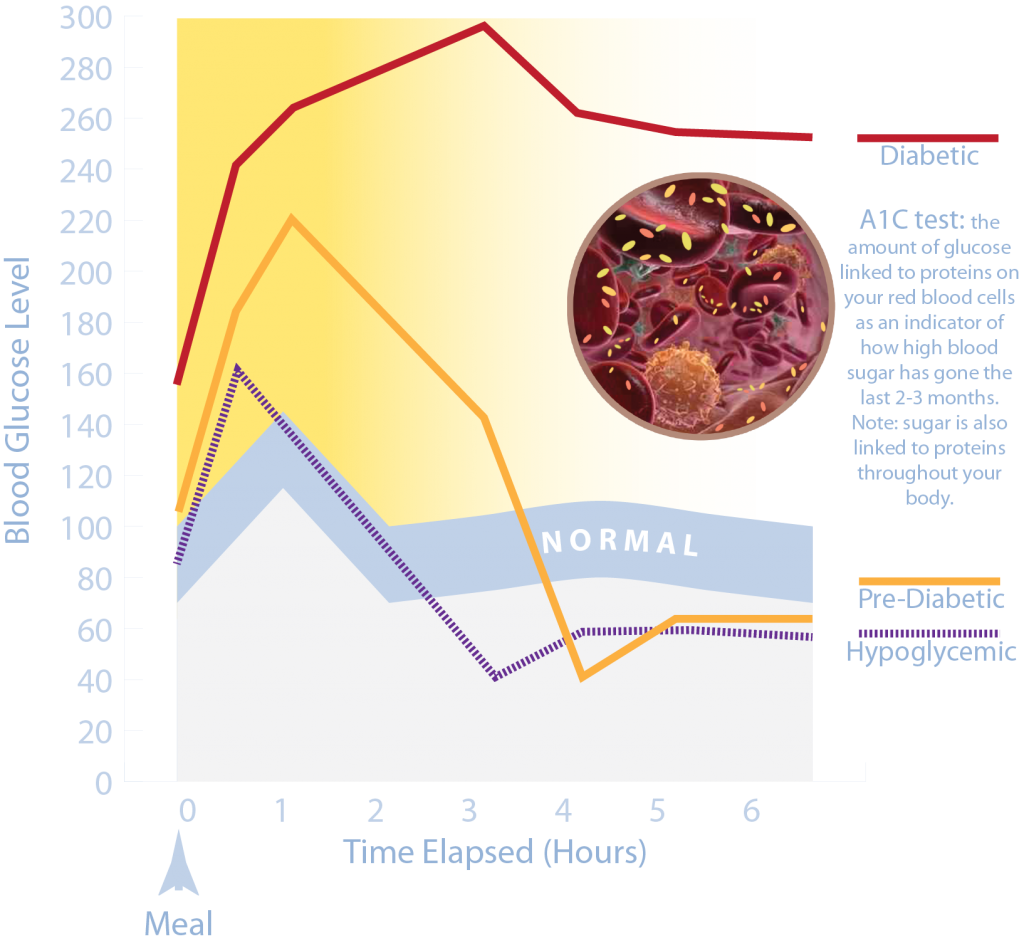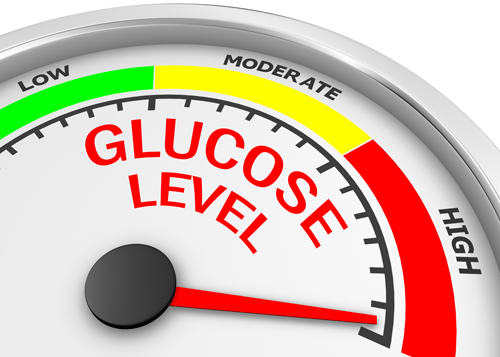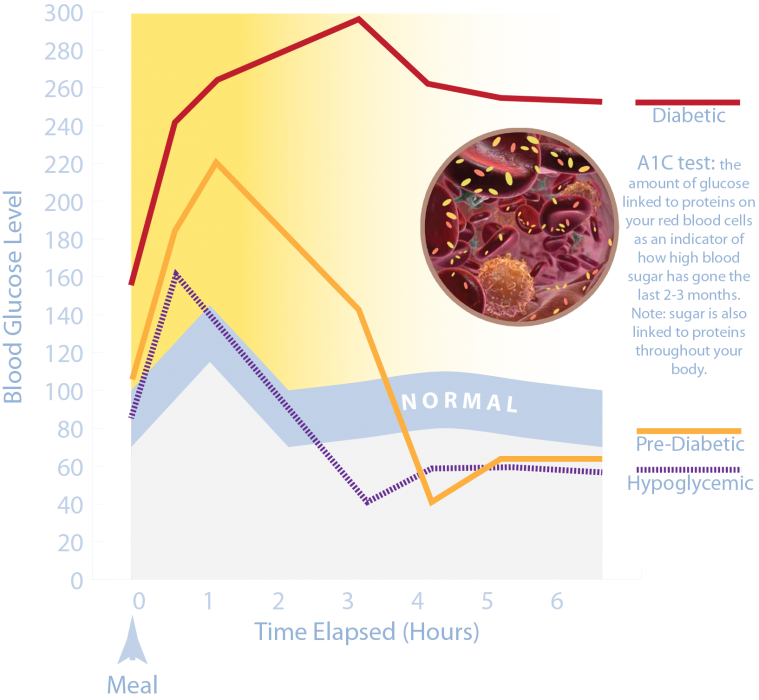How is it that people who eat well, exercise regularly, have normal body composition and take supplements… still don’t feel well. How do these amazing people still have blood sugar issues (and some aren’t even aware)?
After all, they are doing what they are “supposed” to be doing—eating healthy, exercising, maintaining a normal body composition.
Two paths toward understanding
When talking about blood sugar balance, for simplicity’s sake, there are two possibilities:
Insulin resistance characterized by two things: chronically elevated blood sugar levels, and subsequent elevated insulin levels to help move toxic levels of blood sugar into muscles, adipose (fat cells) and liver. Liver, muscle, and adipose are the only cells that need insulin to receive blood sugar—your other cells, eyes, skin, stomach… don’t need insulin to absorb sugar—that means if you become insulin resistant then you are overloading those other organs with excess sugar and the only organs that can protect themselves are your muscles and liver. Adipose (fat) accumulates (even in thin people = you can be “skinny fat”).
Hypoglycemia, which refers generally to low (“hypo”) blood sugar (“glycemia”), but is really characterized by blood sugar fluctuations—blood sugar goes too high, then the pancreas makes extra insulin, this pushes blood sugar too low. High blood sugar is rarely felt. Low blood sugar stimulates anxiety, cravings, tired after meals, light-headedness, irritability, sometimes shakiness. If we eat carbohydrates (which we certainly crave at this point) we feel better.
Both scenarios have blood sugar surges followed by insulin surges. Both are dangerous!

Here’s what we’re missing: Cortisol and Adrenaline.
The blue, yellow, and red lines, above, are blood sugar patterns where you will (initially) have low fasting blood sugar (your fasting glucose looks great on your tests (until it goes too low—and you may even be told “lower is better”).
What’s really happening is post-meal high blood sugar creates high insulin followed by low blood sugar (hypoglycemia) which causes a stress response.
Next your adrenal glands coordinate the stress response by releasing cortisol to increase blood sugar levels. Cortisol tells your liver to dump its glucose stores. Do you wake up 2-3AM?
You wake up with high blood sugar because your liver responded to cortisol.
Overproduction of any hormone is hard on the responsible organ. After some time, your pancreas becomes insufficient, your adrenal glands become insufficient. A different layer of your adrenal glands begin to produce adrenaline as a last ditch effort to elevate blood sugar between meals—you feel shaky and lightheaded between meals. And all this can start well before your labs look “out of range” or you experience other symptoms.
The one pattern you’ll notice is feeling tired after a meal followed by “hangry” (hungry and cranky). These are relieved after eating foods that provide a source of glucose that the body cannot create itself or by drinking coffee (which gets the liver dumping stored glucose into the blood). 10AM coffee and Larabar with its 23 grams of carbs of which 16 are sugars (on the low end) is not a good solution.
Bodies that rely on adrenaline to elevate blood sugar will have insulin surges between meals, rather than following meals. These people can wake up with elevated blood sugar despite a low glycemic diet.
 It’s a nasty, vicious cycle: The important point:
It’s a nasty, vicious cycle: The important point:
Looking healthy, having a muscular body, and exercising regularly does not mean that you have normal blood sugar management.
In today’s modern world, all bets are off regarding physiology. Researchers now recognize “skinny fat” and “non-obese insulin resistance” and “atypical metabolic syndrome” … Relatively thin and fit people can have blood sugar management issues.
There is a vicious cycle common in people today.
While many mechanisms are involved, here’s the basic scenario:
Elevated blood sugar increases insulin. Insulin causes an increase cortisol and cortisol increases blood sugar. And round and round it goes.
People enter this cycle in one of two ways:
- Improper eating. Excess sugar or carbohydrates, excessively large meals or glycemically imbalanced meals can excessively elevate blood sugar levels, beginning the cycle.
- Any stress response elevates cortisol (i.e. emotional stress, parasitic infection, food allergies, gut distress, inflammation, over-exercise, etc.) and that elevates blood sugar.
In other words, you could have a perfect diet and exercise program, but if you have an immune imbalance or chemical / metal toxicity, you will elevate your cortisol and dysregulate your blood sugar. This presents as “prediabetes” and eventually as adrenal fatigue.
Should you lower your blood sugar with medications?
I’ll leave that up to you:
- Metformin reduces sugar absorption in the small intestine (Some people view this as “I can have my cake and eat it too”). Could this lead to insufficient nutrients? (Yes)
- Insulin pushes excessive blood glucose into cells (blood sugar crises averted but at what cost?)
- Pushing blood sugar into cells causes a host of problems:
Blood sugar dysregulation and elevated insulin levels have negative impacts on numerous body systems. ALL of these can be corrected.
Tell your doctor you want to see a Nutritionist and make diet and lifestyle changes.for 6-12 months before medications. This is good medical practice and they should respect that.
Why? If too much glucose is forced into cells, your mitochondria become toxic and no longer produce optimal amounts of ATP for energy and other bodily functions. Your mitochondria are where energy is made, hormone production begins, and more… they become dysfunctional and so do your organs.
Our mitochondria use two primary sources of fuel to produce the energy: fats and glucose. Insufficiency leads to slow energy production, hormone issues, thyroid issues, cardiovascular issues, neurological issues, weight control problems… if you shove too much sugar into your cells, you cannot burn fat for energy.
Elevated insulin blocks fat burning for at least 48 hours.
Better options:
Especially at breakfast, eat a protein-based meal with adequate levels of healthy fat and fiber (plants—above-ground parts like spinach, mushrooms, tomatoes, peppers…) Protein combined with soluble (plant) fibers will not raise your blood sugar. If your blood sugar goes high after such a meal, you either have a hypersensitivity to one or more of those foods that causes a stress response and elevates blood sugar OR you ate too big a meal. (PS. Please buy eggs from pastured chickens which are not the same as “free range” or “organic”. PSS Most bacon is marinated in sugar. PSSS most sausage includes sugar—be particular; it’s all about you!).
Some of my clients do well with a “cleanse reset”. Lose weight and feel great with the Standard Process 21-day program. Just $245 in my office with personalized guidance from me or $280-325 from Amazon with no guidance.
And for those of you who asked, I’m reworking and improving my Rejuveo™ Whole Foods Cleanse to provide better step-by-step directions and many more recipes.
Questions? Let me know 😊I love seeing great people do great things because they feel GREAT.


Leave a Reply
You must be logged in to post a comment.